Related Research Articles

The Moody Blues were an English rock band formed in Birmingham in May 1964. The band initially consisted of drummer Graeme Edge, guitarist/vocalist Denny Laine, keyboardist/vocalist Mike Pinder, multi-instrumentalist/vocalist Ray Thomas, and bassist/vocalist Clint Warwick. Originally part of the British beat and R&B scene of the early–mid 1960s, the band came to prominence with the UK No. 1 and US Top 10 single "Go Now" in late 1964/early 1965. Laine and Warwick left the band by the end of 1966, being replaced by guitarist/vocalist Justin Hayward and bassist/vocalist John Lodge. They embraced the psychedelic rock movement of the late 1960s, with their second album, 1967's Days of Future Passed, being a fusion of rock with classical music that established the band as pioneers in the development of art rock and progressive rock. It has been described as a "landmark" and "one of the first successful concept albums".

On the Threshold of a Dream is the fourth album by The Moody Blues, released in April 1969 on the Deram label. The album reached the top of the album charts, the group's first No. 1 album in the UK.

David Justin Hayward is an English musician. He was the guitarist and frontman of the rock band the Moody Blues from 1966 until that group's dissolution in 2018. He became the group's principal vocalist and its most prolific songwriter over the 1967–1974 period, and composed several international hit singles for the band.
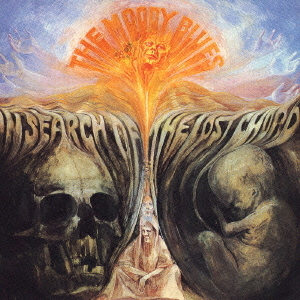
In Search of the Lost Chord is the third album by The Moody Blues, released in July 1968 on the Deram label.

To Our Children's Children's Children is the fifth album by the Moody Blues, released in November 1969.
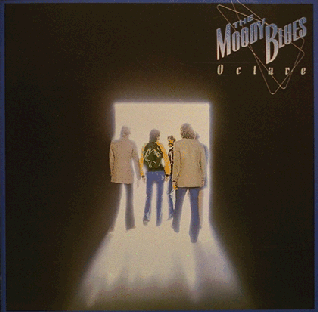
Octave is the ninth album by The Moody Blues, released in 1978, and their first release after a substantial hiatus following the success of the best-selling Seventh Sojourn in 1972. Released after a considerable break, which saw The Moody Blues returning in an era of punk music and disco, Octave produced a reduced commercial outcome for the band, but reached No. 6 in the United Kingdom and went platinum in the United States, where the album reached No. 13. The album produced the hit single "Steppin' in a Slide Zone", which hit No. 39 in the US, in addition to "Driftwood". The album's title is a musical pun: it references both the notion of an octave; and as a word derived from the Latin octavus it refers to this being the eighth album by this line-up of the Moody Blues.

Every Good Boy Deserves Favour is the seventh album by The Moody Blues, released in 1971. The album reached No. 1 on the British album chart, in addition to a three-week stay at No. 2 in the United States, and produced one top-40 single, "The Story in Your Eyes".

John Charles Lodge is an English musician, best known as bass guitarist, vocalist, and songwriter of the longstanding rock band the Moody Blues. He has also worked as a record producer and has collaborated with other musicians outside the band. In 2018, Lodge was inducted into the Rock and Roll Hall of Fame as a member of the Moody Blues.

"Voices in the Sky" is a hit 1968 single by the progressive rock band the Moody Blues, and it was written by their lead guitarist Justin Hayward. It was released as a single in June 1968, with "Dr. Livingstone, I Presume" on the B-side. It was later released on their 1968 album In Search of the Lost Chord, and was the first of two singles from that album, the other being "Ride My See-Saw".
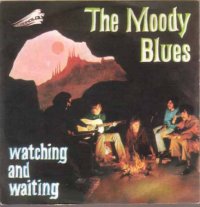
"Watching and Waiting" is a 1969 single by the progressive rock band the Moody Blues, and was written by band members Justin Hayward and Ray Thomas.
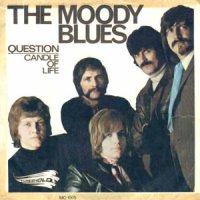
"Question" is a 1970 single by the English progressive rock band the Moody Blues. It was written by guitarist Justin Hayward, who provides lead vocals. "Question" was first released as a single in April 1970 and remains their second highest-charting song in the UK, reaching number two and staying on the chart for 12 weeks. The song reached number 21 on the Billboard Top 40 in the USA. It was later featured as the lead track on the 1970 album A Question of Balance. The single also features the song "Candle of Life" on its B-side, which was from the Moody Blues' previous album To Our Children's Children's Children.
"Floating" is a song by the Moody Blues from their November 1969 album To Our Children's Children's Children, a concept album about space travel, dedicated to NASA and the Apollo 11 astronauts.
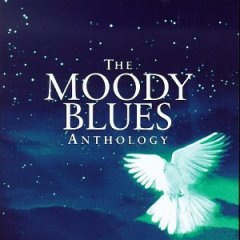
Anthology is a compilation album by the progressive rock band the Moody Blues. It was released in the US on 20 October 1998. It was not released in the UK until 2001 under the title The Collection with different artwork but with the same tracks as the US release.
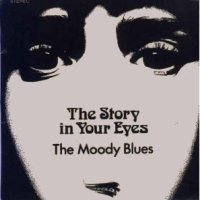
"The Story in Your Eyes" is a 1971 hit single by the English rock band the Moody Blues. Written by the band's guitarist Justin Hayward, it was first released as a single with "My Song" on the B-side, and then on the 1971 album Every Good Boy Deserves Favour shortly after.

Greatest Hits is a compilation album by the progressive rock band the Moody Blues, released in 1989. The band recorded new versions of "Isn't Life Strange" and "Question" with orchestration by the London Symphony Orchestra. The arrangements were overseen by Anne Dudley, who also produced the recordings with Justin Hayward and John Lodge. In 1990, only a year after its original release, the album was re-released as Legend of a Band: The Story of the Moody Blues with different artwork to coincide with the release of the home video documentary of the same name.
"Dr. Livingstone, I Presume" is a 1968 song by the English rock band the Moody Blues. It was written by the band's flautist Ray Thomas, although he does not play the flute in the song. First released in June 1968 on the B-side of "Voices in the Sky," "Dr. Livingstone, I Presume" is one of Ray Thomas's signature child-themed songs, much like his first composition "Another Morning."
"Higher and Higher" is the opening track of the Moody Blues 1969 album To Our Children's Children's Children, a concept album about space travel.
"Candle of Life" is a song by the progressive rock band the Moody Blues, from their album To Our Children's Children's Children, a concept album about space travel. "Candle of Life" was written by bassist John Lodge, and features both Lodge and Justin Hayward on vocals.
"Eternity Road" is a song by the band the Moody Blues, written by band member Ray Thomas, from their 1969 album To Our Children's Children's Children.
References
- 1 2 "To Our Children's Children's Children – The Moody Blues". AllMusic. Retrieved 11 October 2018.